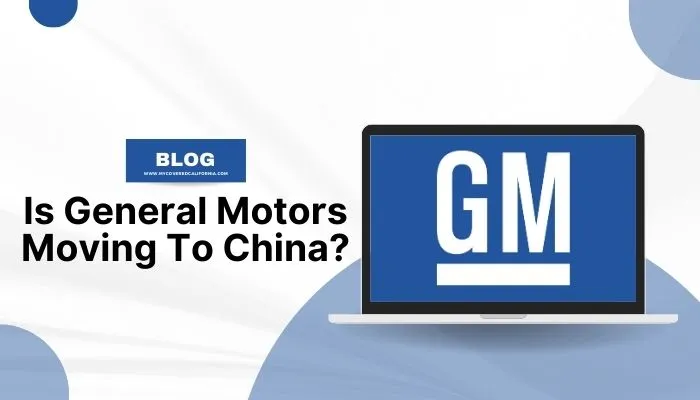Is General Motors Moving To China? The automotive industry is all abuzz with speculations and discussions surrounding the potential relocation of one of the giants in this industry, General Motors (GM), to China.
This article aims at exploring the nitty-gritty in this prospective move and its significance as well as influence on global automobile landscape. The dynamism inherent in the automotive sector makes it important to consider a possible shift by GM towards China.
It can lead to changes in manufacturing locations and bases altering market dynamics, competition and consumer choices. General Motors which is a pillar brand of car manufacturing has an interesting history that dates back to inception.
Starting from humble beginnings up to becoming a global force; GM’s presence spans across continents with varied range of vehicles. Reviewing current global operations gives readers insight into GM’s context for probably coming to China.

Is General Motors Moving To China?
General Motors’ story lies deep within the annals of automotive history. GM influenced the formation of this industry since early 20th century. Its strategy evolution models and market approach over time portrays its resilience and adaptability as a car giant.
Currently, there are operations in key markets around the globe while GM footprint is global. An examination based on company’s market share, regional strength, competitive positioning offers an overall view on present-day worldwide General Motor operations.
GMs vast network of hubs for production throughout many countries attests the involvement of firm in most parts of globe; this part will look at geographical location for these factories thus shedding light about companies’ regional orientation together with its capacity for producing automobiles.
Economic Factors Influencing Global Business Decisions
Economic factors significantly affect multinational corporations.
- This subsection provides an elaborate analysis of economic variables influencing decision-making process such as exchange rates, inflation rates and trends in the global economy for companies such as GM.
- Economic trends play a significant role in determining the health and growth of the automotive industry.
- Considering recent economic changes and their consequences to auto sector is very important since it forms a basis for understanding challenges and opportunities that GM might be facing in its operations. How GM handles economic challenges is critical to its continued achievement.
This division focuses on the company’s strategies designed to cushion itself against economic risks while simultaneously leveraging emerging opportunities thus demonstrating that it can weather storm of uncertainty during tough times.
China’s Growing Significance in the Automotive Industry
China’s emergence as an automotive powerhouse is a key development. The section examines factors behind growth in Chinese automobile market including rising consumer demand, government initiatives and technological progress.
| Multinational corporations are attracted to the Chinese market by many reasons. |
| Such things like wide consumer base, shifting liking of consumers towards other products or services plus favourable government policies will be considered to understand why General Motors among others come here for investment purposes. |
| GM’s history in China has been characterized by strategic partnerships, successful ventures as well as large market shares. |
Analyzing how GM has gone about business in China provides insights into its ability to deal with unique challenges and take advantage of opportunities that come with entry into this particular country.
General Motors’ (GM) Latest Developments and Strategic Moves
This part analyzes the recent pronouncements from GM concerning its operations in China.
- The significance of dissecting such moves is essential for understanding the ongoing position of GM whether in terms of manufacturing, market-entry strategies, or introduction of new products.
- Such collaborative initiatives are a reflection on the company’s dedication to a specific market. This section highlights strategic partnerships or collaborations by GM in China and their importance to the bigger picture.
- How decisions made by GM regarding its operation in China resonate with those of other countries GLOBAL strategy is also a matter of interest. Is there any interdependence between what happens at CHINA level as far as global corporate strategy is concerned?
And if yes, what are the effects on competitive positioning as well as market dynamics?
Factors Influencing Business Decisions: A Comparative Analysis
China’s reputation as “the world factory” lies in its ability to manufacture at low cost. The analysis will involve labor, raw materials, operational expenses among others which all make up manufacturing costs.
| Comparing this data with that from other regions can give insights into whether it makes economic sense for an organization to consider relocation. |
| In order to facilitate international expansion plans, a thorough understanding of the regulatory framework and government policy-making process is necessary for any corporation seeking to venture into China markets. |
| It focuses on examining “current” legislation dictating trade policies and incentives that have implications on running business in Chinese market that might affect GM operations. |
| It is imperative to have a good grasp of prevailing market demand and consumer behaviors within mainland china. |
This would involve studying changing preferences along with emerging trends thereby shaping unique dynamics within Chinese automotive sector.
Potential Benefits and Challenges for General Motors in China
Moving operations to China comes with several opportunities. As such this part will explore areas like potential cost savings; access to fast growing customer market plus possible benefits from partnering local suppliers.
Identification and Analysis of Challenges
No strategic move is without its challenges.
Identifying and analyzing potential obstacles, be they cultural, operational, or economic, will provide a comprehensive view of the hurdles GM might face in transitioning to the Chinese market.
Consideration of Long-term Strategic Implications
This article also seeks to explore the long-term implications that moving to China may bring about.
At its core, this paper will ponder on what such a decision would mean for global positioning besides future growth for General Motors (GM).
Stakeholder Perspectives and Reactions
The destiny of any corporation is influenced by stakeholders’ opinions. Investors’ reactions to GM’s potential entry into China can be used as an indicator how different interest groups evaluate these intentions.
- General Motor’s reputation as well as brand image are immeasurable assets. It includes possible risks connected with their shift towards china plus aspects that may improve them.
- Governments often respond after huge corporate decisions have been made whereas regulatory bodies always make certain moves in relation to corporations’ policies among others.
The geopolitical landscape GM could operate within should be understood through appreciating various responses from the government of China’s side together with other relevant governments.
Conclusion
In conclusion, Is General Motors Moving To China? we shall recapitulate our focus by referring back to the title: Is General Motors Really Thinking about Moving to China?
Recapping key findings and insights provided in preceding sections, this part gives an easy reference for those who want all inclusive knowledge on the subject matter being discussed.
Finally, the concluding thoughts wrap up everything by giving an overall perspective on what it means when General Motors decides to go Chinese and not only does it imply but will affect automotive industry as a whole if at all there are any ripple effects associated with this move.

Hello there, I’m Loretta Flores, your go-to Customer Support Specialist for the GM-Socrates platform. Leveraging my 3 years of experience, I am here to work together to streamline your processes and maximize efficiency.